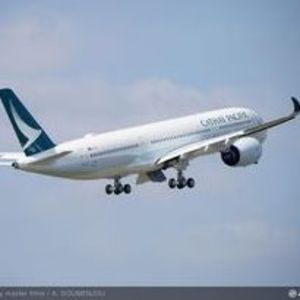Airbus offers regular customer delivery flights with biofuel

Photo: Airbus
June 2, 2017
BY Airbus
Showing its strong commitment towards eco-efficiency, Airbus becomes the first aircraft manufacturer to offer its customers the option of delivering new jets using a blend of sustainable jet fuel.
The 15th A350-900 for Cathay Pacific departed Toulouse on June 1, bound for Hong Kong, with a 10 percent blend of sustainable jet fuel in its tanks. Since the first delivery in May 2016, all of Cathay Pacific’s A350s have been delivered in this configuration.
The biofuel delivery flight concept, originally devised by Cathay Pacific in 2015 is now in full operation and this latest delivery flight confirms that the supply chain set up a year ago by Airbus and Total is functioning correctly, from the fuel production, through an integrated management at its Saint-Martin Toulouse site and to the customer delivery.
Advertisement
Advertisement
“This is a major step for Airbus and a first for the regular delivery of new production aircraft,” said Frederic Eychenne, head of new energies at Airbus. “It enables us to demonstrate that aviation biofuels are today a reality. We now target to expand this initiative to all our delivery sites, close to our customers.”
The first delivery flights from Hamburg, Germany and Mobile, U.S., using this type of biofuel are planned as of 2018. Since 2016, Airbus has offered this option for its delivery flights from Toulouse.
Advertisement
Advertisement
The aim is to continue reducing the carbon footprint of each flight starting with the aircraft delivery. Eychenne said, “Right from the first day of operation, an airline can clearly demonstrate its aim of reducing carbon dioxide emissions, thus helping to meet the commitments of the international civil aviation community.”
Through its brand new design with the latest cutting-edge technologies, the A350 XWB has a lower fuel burn and therefore lower CO2 emissions than the airplane it replaces, so when sustainable jet fuels are included as part of the operation, the net CO2 emissions reduction factor becomes even greater.
As part of its environmental strategy, Airbus intends to continue its efforts by collaborating with all stakeholders in the biofuels sector. “Through this partnership with Cathay Pacific and Total, we have demonstrated that it is possible to set up supply chains for fuels with a low carbon footprint,” Eychenne added. “This initiative confirms Airbus’ commitment to environmental efficiency and its support toward international aviation’s emission reduction targets.”
Related Stories
Avfuel Corp., the leading independent supplier of aviation fuel and services, is expanding its sustainable aviation fuel (SAF) footprint with the addition of a new, strategic supply point in Denver, Colorado—the first of its kind in the region.
ATOBA Energy and Air Moana are partnering to implement scalable solutions for the supply of SAF. The collaboration aims to ensure long-term SAF availability while supporting local initiatives to develop sustainable fuel production in Tahiti.
Kintetsu World Express Inc. has signed an additional agreement with Hong Kong, China-based Cathay Pacific Airways for the use of sustainable aviation fuel (SAF). The agreement expands a three-year partnership between the two companies.
Broco Energy on July 17 announced a new partnership with the Massachusetts Port Authority (Massport) to deliver and transition Massport's fuel tanks to renewable diesel across its various facilities.
Shell Aviation, Accenture, and Amex GBT on July 10 announced Avelia is in the process of evolving to an industry solution with independent data hosting and a multi-supplier model helping users access the GHG benefits of SAF.
Upcoming Events










